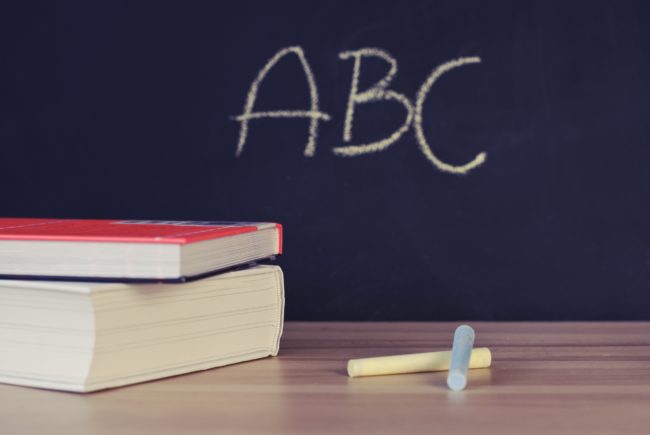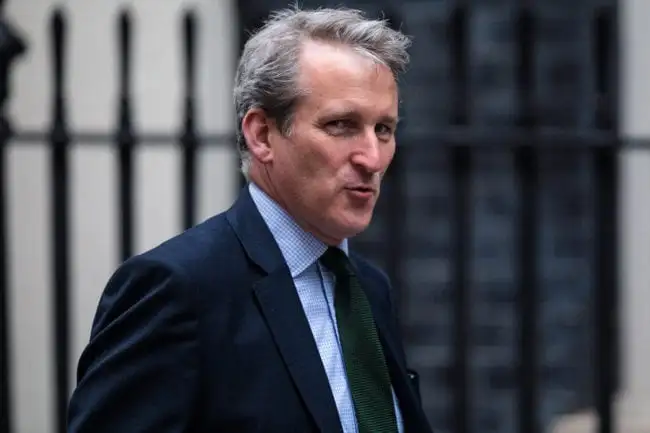Schools to teach about same-sex relationships and gender identity under new sex and relationships education plan

A picture of a gay family from a children’s book (STR/AFP/Getty Images)
Schools in England will be directed to teach pupils about issues including gender identity and same-sex marriage, under new draft government guidance.
Education Secretary Damian Hinds on Thursday published a draft of new guidance for the teaching of Relationships and Sex Education (RSE), which will become compulsory in all schools across the country from September 2020.
The guidance, which was last updated in 2000, has been significantly re-written to include teaching about same-sex relationships and gender identity, as well as issues relating to consent and staying safe online.

A classroom (Stock image via Pexels)
Under the proposals, Relationships Education in primary schools would provide children with the basic understanding of diverse structure of families and the types of relationships they are likely to encounter.
The draft guidance states: “By the end of primary school, pupils should know that others’ families, either in school or in the wider world, sometimes look different from their family, but that they should respect those differences and know that other children’s families are also characterised by love and care for them.”
The guidance for secondary schools adds: “Pupils should be taught the facts and the law about sex, sexuality, sexual health and gender identity in an age-appropriate and inclusive way.
“All pupils should feel that the content is relevant to them and their developing sexuality.
“Sexual orientation and gender identity should be explored at a timely point and in a clear, sensitive and respectful manner.
“When teaching about these topics, it must be recognised that young people may be discovering or coming to terms with their sexual orientation or gender identity. There should be an equal opportunity to explore the features of stable and healthy same-sex relationships.
“This should be integrated appropriately into the RSE programme, rather than addressed separately or in only one lesson.”
The document adds: “Schools are free to determine how they address LGBT specific content, but the Department recommends that it is integral throughout the programmes of study.
“As with all RSE teaching, schools should ensure that their teaching is sensitive, age-appropriate and delivered with reference to the law.”
The guidelines only apply in England. The Welsh government recently announced that it would make LGBT-inclusive relationships and sexuality education compulsory in all schools – whereas Hinds has suggested faith schools may keep the right to exempt themselves from aspects.
The Scottish government has also backed LGBT-inclusive RSE following the Time for Inclusive Education (TIE) campaign.

Education Secretary Damian Hinds (Jack Taylor/Getty)
Hinds said: “I want to make sure that our children are able to grow up to become happy and well-rounded individuals who know how to deal with the challenges of the modern world. Part of this is making sure they are informed about how to keep themselves safe and healthy and have good relationships with others.
“Many of today’s problems did not exist when we last gave schools guidance on how to teach Relationships and Sex Education 18 years ago. The action we’re taking is important to help support teachers and schools design a curriculum that will enrich their pupils in an age appropriate way.
“Good physical and mental health is also at the heart of ensuring young people are ready for the adult world. By making health education compulsory we are giving young people the tools they need to be ready to thrive when they leave school.”
He added: “A guiding principle here is that children and young people at age-appropriate points need to know about the laws relating to relationships and sex that govern our society, so that they can act appropriately and can be safe.
“This includes LGBT relationships, which is a strong feature of the new subject at age-appropriate points.”
Although the subject is mandatory, Hinds said that the guidance “leaves flexibility for schools” to change teachings “bearing in mind their age and religious backgrounds… by reflecting on the teachings of their faith.”
Labour’s Angela Rayner called on Hinds to ensure that LGBT issues were “integrated into the curriculum and not an optional extra”.
Hinds also said parents will keep the right to withdraw their children from sex education – but children will be able to opt themselves back in to lessons ahead of turning 16.
The Conservative minister said: “I propose to give parents the right to request that their child be withdrawn from sex education delivered as part of RSE. Unless there are exceptional circumstances, the request should be granted until three terms before the pupil reaches 16.
“At that point, if the child wishes to receive sex education, the headteacher should ensure they receive it in one of those three terms. This preserves the parents’ right but balances it with the child’s right to opt in once they are competent to do so.”
Responding to concerns, he clarified: “The only part it’s possible to withdraw from is the sex part of relationships and sex education.”

Chairs in a classroom
Ian Green, chief executive at Terrence Higgins Trust, said: “Today marks an important milestone in the journey towards compulsory Relationships and Sex Education in all secondary schools in England with the much awaited publication of the guidance teachers will use to deliver lessons – a shocking 18 years since the last update.
“The draft guidance replaces existing guidance which was first launched long before the majority of young people had internet access on their smartphone and no longer reflects the modern day realities of sex and relationships. Similarly, it’s completely out of date when it comes to where we are with HIV and doesn’t properly equip young people for the challenges they face all these years later.
“This update is long, long overdue and comes at a time when on average one young person aged 15-24 is diagnosed with HIV every day in the UK and where young people account for the largest proportion of new STI diagnoses. That’s why LGBT-inclusive and quality RSE lessons are needed now more than ever.
“But there’s still work to do to ensure RSE is fit for purpose and adopted by all schools, including independent and faith schools – we will hold the Government to account on this. The Government has missed its original target of September 2019 for compulsory RSE lessons in England, with a 12 month delay. We are unequivocal that this timeline must not slip any further.”
Green added: “RSE lessons are crucial to normalise discussions on HIV and sexual health among young people. Schools have an important role in signposting young people to sexual health services and debunking the myths that still surround sexual health and we are pleased to have secured a commitment by the Government within the guidance that this will happen in lessons.
“Alongside proper guidance, it’s of the utmost importance that teachers are provided with the training and resources to confidently deliver lessons of a high quality. In his statement, earlier in Parliament, the Secretary of State for Education, Rt Hon Damian Hinds MP, committed to ensuring the “provision of quality materials” in schools – we will hold the Government to ensure this is a reality in all schools.
“It should also go without saying that RSE needs to be properly assessed by OFSTED – as with the rest of the curriculum – to ensure its quality and that no young person is left behind. Anything short of this will mean Relationships and Sex Education is compulsory in name only.”
Hatti Smart of National Student Pride, said: ‘This is wonderful news for the LGBT+ young people who have been feeling marginalized and left out of the current curriculum. We welcome the Education secretary’s words.
“But we now need to know if LGBT content will be part of the compulsory guidance and during the 12-week consultation. We hope as many LGBT+ voices as possible take part to ensure this happens with no-opt outs for any schools on LGBT inclusive RSE, including faith schools.
“We see the power of talking about your identity from a young age every year at our event. So introducing positive conversations about your sex and gender identity it at an age where teen angst is at its highest is so valuable.
“In the years after section 28 which banned ‘promoting homosexuality,’ this will finally make a significant step into making young LGBT+ people feel part of the conversation at school and help them shape their identity safely.”
Humanists UK Chief Executive Andrew Copson said: “We can’t praise the Government enough for this progressive advance. Children are not the possessions of their parents but human beings with their own rights. Government is right to recognise this and bring us one step closer to making sure every young person is healthy, happy, and safe.
“We hope the Government now follows up this announcement by making similar moves for young people under the age of 16 with respect to religious education and collective worship, where the law now lags behind and that Welsh, Scottish, and Northern Irish politicians take heed and make similar moves with respect to their own curriculums.”
Barnardo’s Chief Executive, Javed Khan said: “We welcome the proposed guidance, and its focus on the issues Barnardo’s has campaigned for such as consent, healthy relationships and staying safe online. We are pleased to see emotional, reproductive and mental health included as requested by our young service users.
“It’s vital teachers have quality resources and proper training so they can deliver sensitive subjects that are age-appropriate and answer any questions children have confidently. Schools must communicate regularly with parents to help them feel comfortable about what their children are being taught.”

